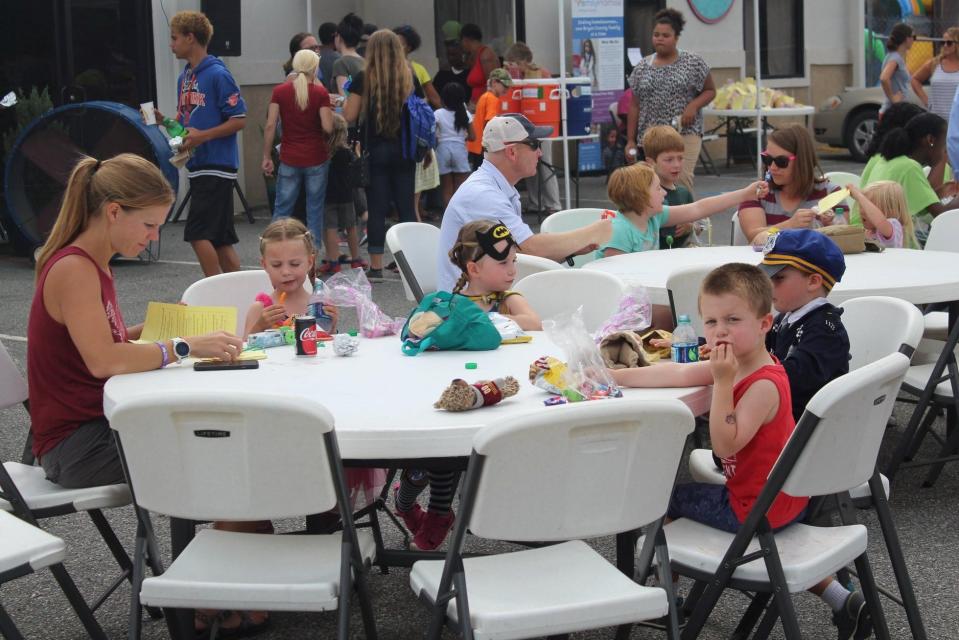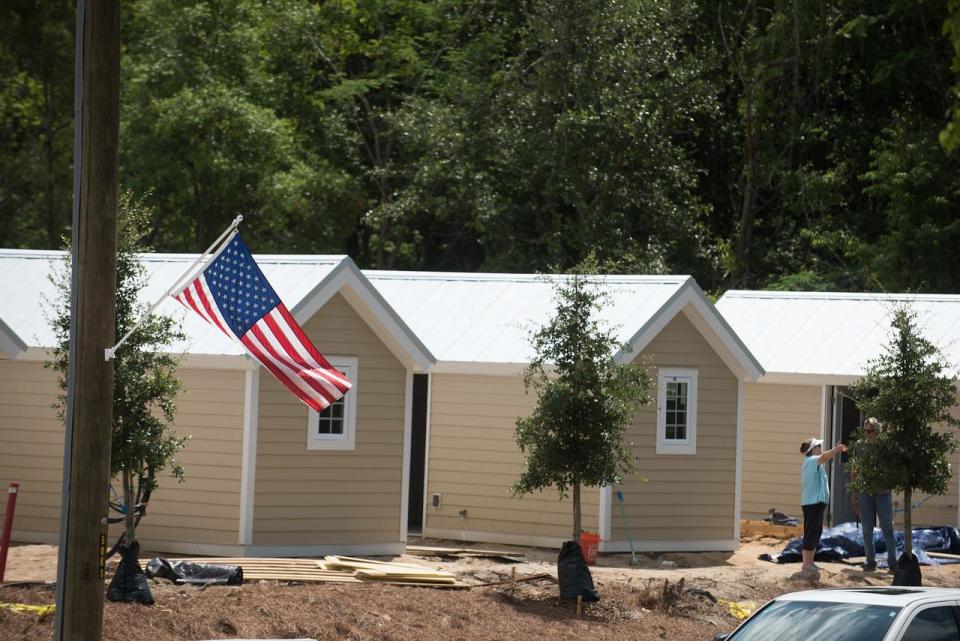Resource Guide: What to know if you're facing eviction in Chatham County
This story was updated on Nov. 26, 2021 with new resources for tenants behind on utility payments
Thousands, if not millions, of people across the country are facing eviction this week after the Centers for Disease Control's moratorium on COVID-related evictions ended on Aug. 1.
The order was put in place more than a year ago as the economic and social shutdown from the global SARS-COVID-19 pandemic caused many people to lose their jobs. The eviction moratorium was not a catch-all for renters facing eviction, but provided much-needed protection for people who lost income as a direct result of the pandemic.
As of July 3, more than 22% of Georgia's renters were behind on their rent, according to U.S. Census data. While the issue disproportionately impacts households of color, all demographics — save those households that remain financially stable — have faced hardships when it comes to paying rent on time and in full.
More: Savannah's rental market surges in price, plummets in inventory
Helpful resources
In Chatham County, Magistrate Clerk of Court Tracie Macke reported a backlog of 285 eviction cases ready to be heard in July. These cases are a subset of the total 536 dispossessory warrants — a sworn statement signed by the landlord or his/her agent that sets forth the reason for the proposed eviction against tenants — landlords have filed that directly cite the CDC order.
While the problem seems overwhelming, for both tenants and landlords, there is help available for people who are facing possible eviction.
More: Despite moratorium extension, Savannah unprepared for 'looming crisis' of evictions
About $8.7 million in emergency rental assistance is available for Chatham County renters, which can go toward rent or utilities. The program is available only to renters who can show proof that they lost their job due to the pandemic (whether that's because of lay-offs, furloughs or childcare issues) and who have exhausted all other avenues of payment, like unemployment assistance.
The slow drip of funds — less than $500,000 administered in both April and May — distributed is two-fold: there is a backlog of clients and paperwork, and not enough people know where to find help.
To qualify for emergency rental assistance, you must:
Be a Chatham County resident;
Have at least one household member at-risk for eviction, housing instability or homelessness;
Have a household income of $57,600 or less;
Show evidence that at least one person has qualified for unemployment, lost income or experienced financial difficulties because of the pandemic; and,
Prove that rental assistance has not already been provided by this or another program.
People who qualify can get up to 15 months of help, but the money is a one-time band-aid. Area nonprofits said long-term work to stem the concurrent housing and poverty crises in Savannah, which existed prior to and has been exacerbated by the global pandemic, needs to be done to help families beyond the availability of these emergency funds.
To apply for rental assistance funds, contact either the United Way of the Coastal Empire or the Economic Opportunity Authority of Savannah-Chatham County, the two nonprofit organizations designated for the distribution of emergency rental assistance (ERA)):
United Way's 2-1-1 line:
The 2-1-1 helpline is a permanent call center that directs clients to services. Once you give your information and explain your situation, the helpline connects you with the best agency or organization to help.
The call center has experienced a high volume of demand, and warns callers of long wait times, according to the United Way's website. The website also lists the qualifications for rental assistance and provides online resources.
Contact: Dial 2-1-1, (912) 651-7730 or https://uwce.org/ccera
Economic Opportunity Authority of Savannah-Chatham County:
The nonprofit handles intake and applications before directly paying client's bills.
Contact: (912) 438-8077 or https://eoarentalassistance.itfrontdesk.com/

Family Promise:
The family and child services-based nonprofit is helping United Way and the Economic Opportunity Authority (Chatham County's distributors of emergency rental assistance) with applications for rental assistance. They also assist with emergency shelter placement if you or your family experience homelessness.
Contact: 912-790-9446 or https://www.familypromisesavannah.org/
Help with utility bills
In November, Chatham County announced a new program to help homeowners and renters with utility bills. The funds are from the state of Georgia and being distributed by the Economic Opportunity Authority. The money is for heating and cooling bills, and a separate program is for water bills. Both payment programs require the same paperwork.
Here's who qualifies in Chatham County:
Proof of income for the past 30 days
Proof of Social Security numbers for all household members
Most recent gas and electric bills
Proof of citizenship or legal immigration status
For more information, visit www.georgiacaa.org or call the EOA at (912) 238-2960
The U.S. Consumer Protection Bureau's Assistance Finder:
The Consumer Protection Bureau launched a national website aimed at helping landlords and tenants find localized access to resources.
Contact: www.consumerfinance.gov/renthelp
Free landlord-tenant mediation
The Savannah Mediation Center is offering free mediations for tenants facing eviction due to COVID-19. The service helps both parties settle out of court, which gives tenants and landlords more control over the outcome of the case. Space is limited, so the center asks for both landlord and tenant to complete the application form for their case to be reviewed.
Contact: 912-354-6686 or https://mediationsavannah.com/landlordtenant/
Services for people experiencing homelessness
This information was compiled by freelance writer Jessica Leigh Lebos and included in the June 2019 issue of The Beacon, the News' former quarterly magazine
For individuals who are evicted and facing homelessness, there are organizations that can provide free meals, sleeping arrangements, and showering and laundry facilities. This list is by no means exhaustive, but includes as many supportive and wrap-around services as possible. If your organization is missing from this list, please contact at znicholson@gannet.com to be considered for inclusion.
Many of the organizations listed here with emergency services also offer transitional programs. Donations are always welcome, especially clothing, as are feminine supplies and baby formula for women’s shelters, which represent an extra cost-burden for people experiencing homelessness.
Free meals
Emmaus House: 18 Abercorn St., 495-8828, unitedministriessavannah.org
United Ministries is a cooperative effort of six area churches to offer hot breakfasts Monday-Friday as well as showers and laundry facilities Monday-Thursday.
Social Apostolate: 502 E. Liberty St., 233-1877, socialapostolate.org
A division of the Catholic Diocese, the Franciscan Sisters provide hot meals and showers Tuesday-Friday as well as crisis intervention services for all members of the community in need.
People Helping People: Forsyth Park South End, 667-5857
Every Sunday between 12:30 p.m.-2 p.m., rain or shine, friendly volunteers from Relentless Church hand out fresh-made sandwiches near the tennis courts.
Shelters for men
Inner City Night Shelter Safe Haven: 124 Arnold St., 232-4673, icns-sav.com
Independent, non-religious shelter welcomes men with evening meal. Clients must be in by 7 p.m. and exit by 8 a.m. and may stay up to 30 days. 32 beds, availability varies with weather.
Salvation Army: 3100 Montgomery St., 651-7420, salvationarmygeorgia.org/savannah
Savannah’s outpost of the worldwide church serves dinner and breakfast every day and does not require religious participation for shelter. Dinner 7 p.m. daily. Men must be in by 5 p.m. and exit by 7 a.m.; women must be in by 4 p.m. and leave by 8 a.m. 32 beds for each gender.
Grace House @ Union Mission: 120 Fahm St., 238-2777, unionmission.org
Emergency shelter has 31 beds where clients can stay up to 90 days. Union Mission also offers case management and mental health services, and there is a separate program for those returning from prison.
Old Savannah City Mission: 2414 Bull St., 232-1979, oscm.org
Gospel ministry offers emergency shelter for up to seven days, showers and hot meals as well as drug and alcohol rehabilitation, and programs for those returning from prison. 40 beds, clients must be in by 5 p.m. and exit by 7 a.m.
Shelters for women
Inner City Night Shelter Sojourner: 124 Arnold St., 232-4673, icns-sav.com
Independent, non-religious shelter welcomes women with evening meal. Be in by 7 p.m., exit by 8 a.m., 24 beds. Clients may stay up to 30 days. Children may eat but are not allowed to stay overnight.
Salvation Army: 3100 Montgomery St., 651-7420, salvationarmygeorgia.org/savannah
Shelters for those with children
The Magdalene Project @ Union Mission: 120 Fahm St., 912-238-2777, unionmission.org
Union Mission provides 40 beds for women with children at a safe, off-site location. Families can stay up to 90 days and receive services to put them on the road to self sufficiency.
Safe Shelter: P.O. Box 6119, 912-629-8888 (24-Hour Crisis Line), safeshelter.org
Women with children who are escaping domestic violence can find temporary shelter in 48 beds as well as childcare, job counseling, and legal services.
Family Promise of Greater Savannah: 126 Horizon Park, 912-790-9446, familypromisesavannah.org
Providing families a place to sleep as well as a day center where clients can shower, find childcare, and meet with case managers.
Tom D. Austin House: 912-238-2960, eoasga.org
Operated by the Equal Opportunity Authority, this transitional 12-unit apartment complex includes on-site support services.
Mental health and disability services
J.C. Lewis Health Care Center @ Union Mission: 125 Fahm St., 498-8887, jclewishealth.org
Chatham Savannah Authority for the Homeless: 761 Wheaton St., 90-3400, homelessauthority.org
Gateway Behavioral Health Services: 800 E. 70th St., (866) 557-9955, gatewaybhs.org
Other services
Savannah LGBT Center: 1515 Bull St., 912-304-5428, firstcitypridecenter.org
While there is not a local shelter that serves nonbinary gender individuals, Savannah’s LGBT Center can help direct to resources.
Park Place Outreach: 514 Henry St., 912-234-4048, parkplaceyes.org
Specifically for homeless youth ages 11-17, Park Place offers temporary shelter for up to three weeks as well as ongoing support. Teens can find compassionate refuge here 24 hours a day, 7 days a week.
Greenbriar Children’s Center: 3709 Hopkins St., 912-234-3431, greenbriarchildrenscenter.org
Nurturing, safe haven for youth age 11-21 accommodates up to 18 children at a time with food, shelter, counseling and cultural outings. Open 24 hours a day, 7 days a week.

Chatham-Savannah Authority for the Homeless Tiny House Project: 761 Wheaton St., 912-790-3400, homelessauthority.org/veterans-services
The Cove at Dundee provides permanent housing and wraparound services for 71 eligible veterans.
Freelancer Jessica Leigh compiled the list of homeless services.
Zoe covers growth and how it impacts communities in the Savannah area. Find her at znicholson@gannett.com, @zoenicholson_ on Twitter, and @zoenicholsonreporter on Instagram.
This article originally appeared on Savannah Morning News: Facing eviction in Savannah GA? Here's a guide to locate help

